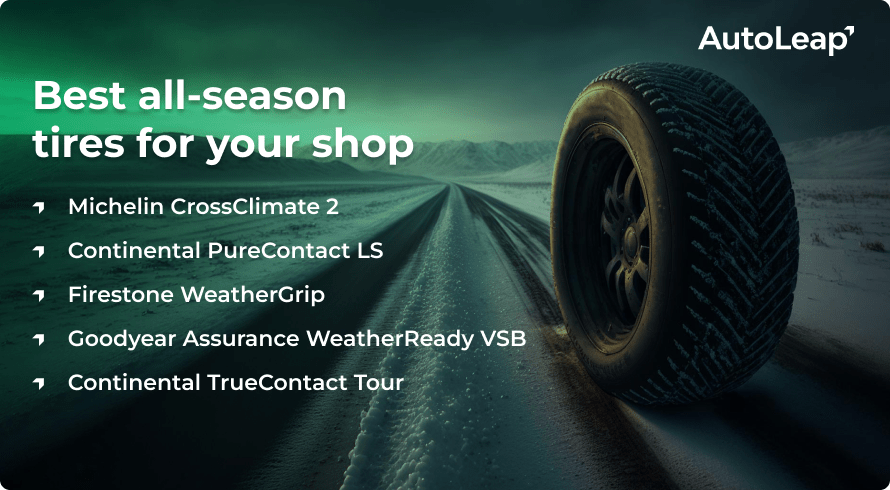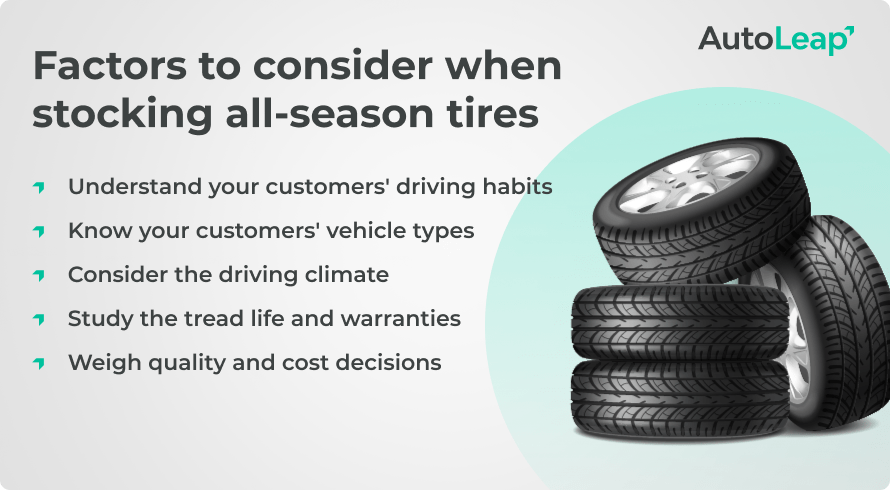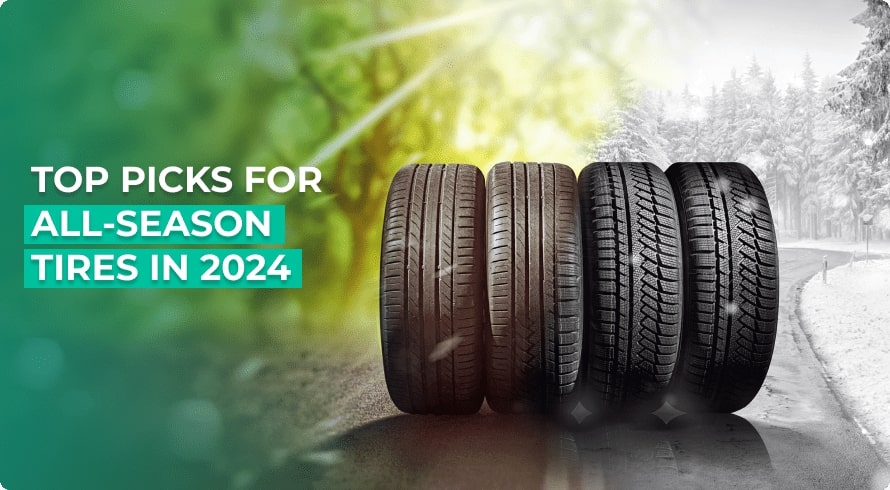Your customers appreciate good value, and all-season tires can deliver a strong return on their investment. By stocking your tire shop with quality all-season tires, you can exceed customer expectations and keep them returning.
Let’s dive into the top options for all-season tires at your shop!
Schedule a free demo today!

Boost your shop sales

Simplify shop management

Empower your technicians
Best all-season tires of 2023

All-season tires are the best choice for drivers with utility vehicles, 4x4s, or minivans. They are practical and last a long time.
Here are some of our top picks for the best all-season tires in 2023.
Michelin CrossClimate 2
The Michelin CrossClimate 2 is a solid all-around performer in warm to winter conditions. The tire has a 3PMSF rating, performing well on snow and ice. When it comes to all-season tires, that rating is a premium feature that will appeal to your customers.
Drivers love this tire because it performs well, is comfortable, and is quiet. Their vehicles can perform well in different driving conditions, such as dry or moist roads, without impacting their traction control.
The Michelin CrossClimate 2 has a durable tread and comes with a six-year, 60,000-mile warranty, which will also attract customers.
Continental PureContact LS
Another top option is the Continental PureContact LS. Experts and online reviewers love this tire. It’s reliable with excellent traction and control on wet and dry roads. It even gets solid performance marks when tire composites lose their softness and grip in cold weather. This is a well-rounded option with a quiet, comfort-laced drive and a six-year, 70,000-mile warranty for the set.
These tires have a special compound that reacts to the weather and smooths out a customer’s drive. Their vehicle will keep a smooth driving feel at high speeds with reduced noise and vibrations. Overall, it’s a balanced option for many customers.
Firestone WeatherGrip
All-season tires are versatile, but the Firestone WeatherGrip takes versatility to another level. This tire excels in rainy conditions on wet roads. The unique rubber works great on icy surfaces as well.
The Firestone WeatherGrip uses a unique technology called Hydro-Grip to improve its traction. This technology makes use of the grooves in the tire treads. Even on bad roads, standing water or snow does not affect a vehicle’s traction.
This premium tire option has a five-year, 65,000-mile tread wear life warranty.
Goodyear Assurance WeatherReady
Goodyear is on the list with its Assurance WeatherReady series. It inspires confidence for snowy weather because it has the Severe Snow Service certification. This certification allows for reliable traction on snowy or icy roads.
Goodyear’s tire package includes Weather Reactive Technology. This technology uses 3D Treadlock Tech Blades and ribs to stabilize slippery roads. The tire compounds have silica for better grip on wet roads. The Sweeping Tread Grooves help channel water away from the tire’s grip through quad water channels. This allows the tire to resist hydroplaning. The Zigzag Biting Edges help give extra oomph to its road grip for snowy roads.
Goodyear’s tires include a warranty for six years or 60,000 miles.
Continental TrueContact Tour
Last but not least is the Continental TrueContact Tour, a customer favorite. It is a standard touring type of tire that delivers a valid value option regarding tread wear life span.
This tire compound has more hard rubber parts that make the tires last longer and save fuel. It also responds well in any weather. Continental’s Comfort Ride technology reduces vibrations with a layer under the tire tread. It works in any weather. However, this comes at some cost, with more noise generated by the bulkier tire.
The wide grooves don’t slide on wet roads. Silane additives make it easier to grip slippery surfaces. However, these tires need to be fixed in the snow.
Benefits of all-season tires
As a tire shop owner, you know the advantages of all-season tires compared to other options. But let’s provide a refresher!
- Versatility: Everyday vehicle owners usually buy all-season tires because they are durable and versatile. Universal tires sell better than specialty tires because they can be used in more situations. These sturdy tires provide year-round comfort and traction, making them an excellent value for most drivers.All-season tires have rubber and carbon compounds that work well in various weather conditions. This helps with grip and saves fuel. The best ones even hold their own in light snow without compromising much in snow traction and braking.
- Environmentally friendly: More and more people are buying hybrid and electric vehicles because they are better for the environment. Unsurprisingly, customers want to buy tires that reduce their carbon footprint.These all-season tires are a sustainable choice. They last a long time and don’t need to be replaced often. This leads to fewer tire purchases, less waste processing, and customer savings.
- Enhanced performance: All-season tires are also known as ultra-high performance (UHP) tires. They perform well in different weather and traction conditions. Most tires have a rubber-carbon mix that works well on hot or cold surfaces, improving traction.All-season tires have good grip, smoothness, and wear regardless of use. Driving with these tires provides peace of mind, as the grip remains uncompromised.
- Variety of options: People like all-season tires because they can choose the right kind for their needs. Tires in this category can range from a cheap $100 up to $400 and higher for the performance-heavy varieties used on high-end vehicles. This pricing spread allows customers to invest according to their needs and budgets.Investing in quality all-season tires helps customers save on multiple seasonal tire changes. This makes them an attractive investment for everyone.
Factors to consider when buying all-season tires

When selecting all-season tires, think about more than just the weather. As a tire shop owner, you need to understand each vehicle’s specific needs.
It’s essential to understand each customer’s needs to provide appropriate recommendations. This includes considering factors like weather and vehicle use. Ensuring safety and satisfaction will boost your business’s credibility.
Here is how you can choose the right tires for any customer who stops in your shop.
Understanding your customer's driving habits
To choose the best tires, start by knowing your customer’s driving habits. Consider factors like how often they drive, their vehicle type, the road conditions they encounter, and the climate they drive in. Regular tires are suitable if you go to work or run errands on city roads.
But as a driver’s needs increase, your tire shop must find the right tire for maximum impact and longevity. If they drive long distances, stock tires with rugged treads and stable walls. Luxury sedan drivers will want treads that reduce sound and vibration. Some car enthusiasts want their all-season tires to have better grip and control for turns.
Let’s break these down further.
- Type of vehicle: The type of vehicle your customer drives determines which tires to choose. Many buyers are attracted to sedans and luxury cars because they prioritize comfort and come with durable tires. SUVs and 4×4 trucks are different because they carry more weight and stress on the tires.
- Geographic and climate factors: Customer locations and their respective climates will influence tire purchasing decisions.When driving in the rain, it’s essential to have tires that provide good grip. Customers should opt for specialty tires when expecting heavy rain or snow, as all-season tires may struggle in these conditions.
- Tread life and tire warranty: Most customers worry about how long their tires will last before they need to be replaced. Good all-season tires usually have mileage warranties and are trusted to last because they are durable.Tires have wear indicators and marks that show when it’s time to visit your tire shop. These measures help gauge and select tires precisely per the customer’s specifications.
- Quality to cost decisions: Each customer brings a unique budgetary constraint regarding their tire purchases. Luxury sedan owners may prefer premium tires, while pickup owners will prioritize utility over comfort.It’s always tempting for tire shops to market the most premium and luxury tire offerings to customers. However, some customers only support businesses that offer the best value for their money. To appeal to more customers, find a nice inventory balance between both.
How all-season tires differ from other tire types
While the average customer might view all tires as the same, a tire shop owner knows that’s far from the truth. One of the most common mix-ups is between all-season and all-weather tires.
Let’s unravel the mystery and discuss the difference between all-weather, all-season, summer, and winter tires.
All-season tires
All-season tires are the best option for customers seeking a one-size-fits-all solution. They are crafted to perform reasonably well in light winter and the summer heat. These tires have patterns that work well in both seasons. However, they are not ideal for extreme weather.
All-weather tires
Manufacturers test all-weather tires rigorously to make sure they handle diverse conditions. This keeps drivers safe and ensures a good grip in any weather. The mountain and snowflake symbols on these tires show they passed extensive testing and can control changing road conditions. They have multiple subsets that are tailored to more specific driving needs.
Summer tires
Performance tires designed for summer perform exceptionally well in moderate heat. The softer rubber gives excellent grip. This helps with handling and cornering on the road. However, the stickiness decreases in cold places, causing performance to drop.
Winter tires
Winter tires are the best bet when temperatures drop and the roads get covered with snow. These tires have a unique rubber that can handle frigid temperatures. They work well on snow and ice. The tread patterns feature deep grooves to combat snow and slush effectively.
Choosing the right all-season tires
Customers will consider their driving habits to find the right all-season tire. But what specific model will they choose?
There’s a variety of options for your tire shop to stock. Let’s break each down.
Touring
Touring all-season tires are the most basic option that is often suitable for passenger vehicles and sedans. These tires are designed for comfort and a durable driving experience.
Grand Touring
Grand Touring versions improve on the basic Touring by adding more intricate and refined tread patterns. These tires provide excellent noise and vibration reduction, significantly improving the driving experience.
Highway
Highway all-season tires last longer and are better for extended highway driving than Grand Touring tires. These tires give you a controlled drive, smooth ride, and quiet performance. They also maintain good traction and control at high speeds. Drivers can also maintain their ability to turn quick corners regardless of the weather conditions they face.
Crossover and SUV Touring
For drivers of crossover or 4×4 SUVs, SUV Touring all-weather tires offer many of the same benefits. They also handle the higher weight and drivetrain stress of larger vehicles. These tires are popular because they are commonly used on slippery roads and rainy areas.
Closing thoughts
Tire shop owners can use this guide on all-season tires to accommodate your customers’ versatile driving needs. Stocking a good assortment of all-season tires is integral to growing your customer base and setting up your tire shop for long-term success.
FAQs
What is the best brand of all-season tires?
Many wide-ranging options exist from top manufacturers. Companies like Michelin, Goodyear, Firestone, and Continental make tires for all weather conditions.
What is the #1 rated all-season tire?
To choose the best tire, consider what’s essential: a quiet ride, good traction on wet or snowy roads, and travel speed.
Who makes the best all-season tire for winter?
The Michelin CrossClimate 2 handles all winter conditions and works well in other weather.









